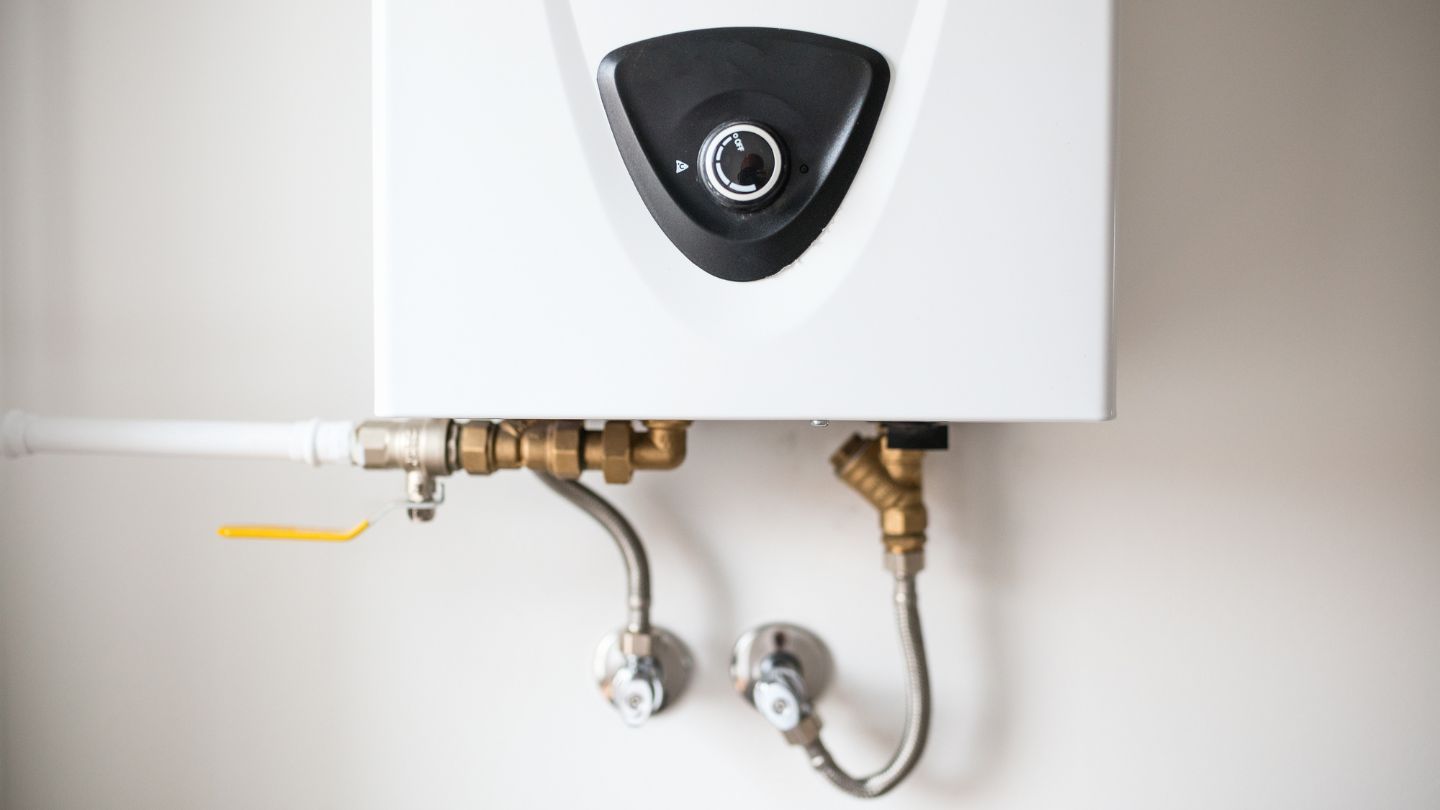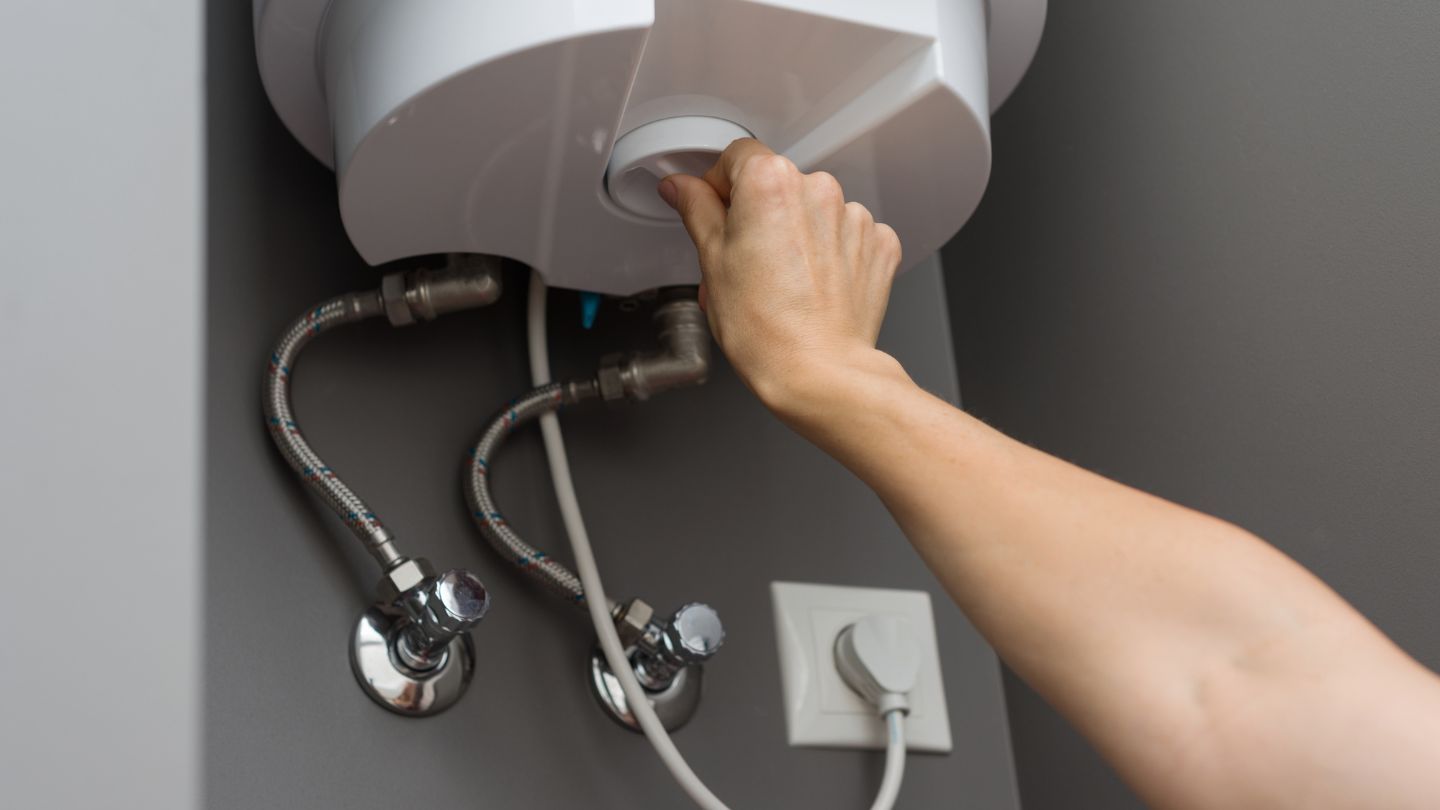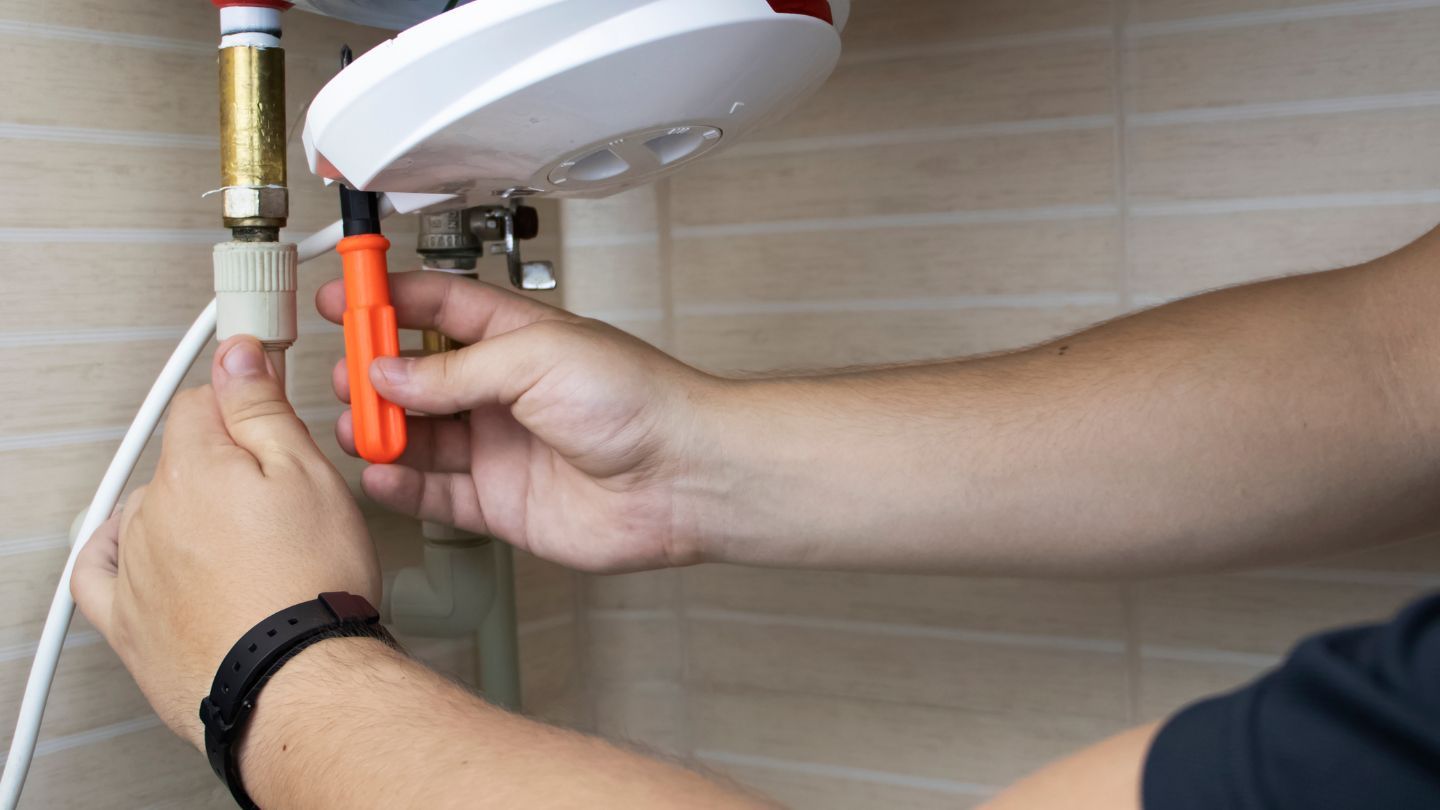Are you concerned about
preventing a tankless hot water heater from freezing this winter? Freezing
temperatures can cause serious damage and costly repairs. This guide will help
you protect your unit with essential tips and preventive measures, ensuring a
reliable hot water supply even during the coldest months.
Key Takeaways
Freezing
temperatures can severely damage tankless water heaters, making proper
insulation and maintenance crucial for prevention.
Essential
measures for prevention include insulating pipes, ensuring a consistent power
supply, and choosing a well-sheltered installation location.
Regular
maintenance checks and winterizing steps, such as draining the unit and
inspecting components, are vital for ensuring optimal performance and
preventing freezing.
Understanding the Risks of Freezing
Tankless water heaters are
highly efficient, but they are also vulnerable to freezing in cold weather.
Freezing can cause internal components to crack as ice expands, leading to
leaks and significant damage. This damage may require extensive repairs or even
complete replacement.
Moreover, during winter, the
energy demand for heating incoming water increases as water temperatures drop.
This increased load can strain the heating system if it isn't properly
maintained. By addressing these risks proactively, you can ensure uninterrupted
hot water and protect your investment in a tankless water heater.
Impact of Cold Weather on Tankless Water Heaters
In freezing temperatures, the
efficiency of tankless water heaters may decline, leading to longer wait times
for hot water and higher energy consumption. Poorly insulated pipes and units
are particularly at risk of freezing, which can damage the entire system,
including critical components like the heat exchanger.
Modern tankless water heaters
often come equipped with built-in freeze protection systems capable of
operating at extremely low temperatures. However, these systems require a
consistent power supply to function effectively. If power is lost, the heater becomes
vulnerable to freezing.
A recirculation system can be
installed to keep water moving through the pipes, reducing the risk of
freezing. Routine maintenance is essential to ensure all systems operate
efficiently, especially during colder months.
Common Causes of Frozen Tankless Water Heaters
Tankless water heaters don't
have the advantage of retaining hot water, unlike their traditional
counterparts which keep a supply at all times. The on-demand heating process of
tankless units leaves them exposed to freezing risks when the weather turns cold.
They are particularly prone to damage if not adequately insulated, as good
insulation is vital in shielding both the pipes and the heater itself from
frigid temperatures.
In situations where there's a
power outage, tankless water heaters may be susceptible to freeze since they
lose their heat, and crucial freeze protection features become non-operational.
Standing water inside the unit can freeze, leading to potential damage to
internal components. It is essential for these types of heaters to have access
to an uninterrupted power source so as to avoid freezing issues that can impair
their operational capabilities during periods of extreme cold.
Essential Freeze Prevention Measures

To avert the freezing of a
tankless water heater, it is critical to take preventive actions. Applying
insulation to both the water pipes and the heating unit itself can decrease
heat dissipation and diminish the likelihood of freeze-ups. Employing materials
such as fiberglass or polyethylene insulation assists in preserving heat within
these components, thereby thwarting freezing.
Enlisting professional services
is essential for the optimal installation and insulation of your tankless water
heater. Their expertise ensures that your unit is installed with precision,
effectively reducing potential freezing hazards.
Winterizing your tankless water
heater involves deliberate measures designed specifically to prevent it from
becoming frozen. These steps are crucial for maintaining uninterrupted service
during colder months.
Insulate Pipes and Heater Unit
Proper insulation is a critical
defense against freezing temperatures. While fiberglass or polyethylene
materials are commonly used, professional plumbers can identify the most
effective insulation methods tailored to your system. They ensure that both the
pipes and the heater unit are fully protected, reducing the risk of cold air
seeping in and freezing the water.
Rather than attempting to apply
insulation yourself, professional installation guarantees that every vulnerable
area is covered. This thorough approach significantly enhances protection
against freezing and ensures the system operates at peak efficiency.
Maintain a Consistent Power Supply
A steady power supply is
essential for the built-in freeze protection systems in modern tankless water
heaters. During power outages, the lack of electricity can disable these
features, leaving the unit susceptible to freezing. Instead of relying on temporary
fixes, professional plumbers can install backup power solutions such as
generators or uninterrupted power supplies (UPS). These systems ensure that the
heater continues functioning, even during outages, providing continuous
protection.
Install in a Sheltered Location
The location of your tankless
water heater significantly impacts its performance in cold weather. Installing
the unit indoors in a well-insulated area, such as a basement or utility room,
offers optimal protection. For outdoor units, professional plumbers can provide
additional enclosures or insulation to safeguard against freezing. By
consulting experts, you ensure the heater is strategically placed for maximum
efficiency and minimal risk.
Additional Protective Strategies

Numerous supplementary tactics
can be employed to safeguard your tankless water heater against freezing.
Employing top-tier pipe insulation is an effective way to maintain a stable
water temperature and diminish the risk of freeze events.
Ensuring that there's an
uninterrupted power source is crucial for the activation of the freeze
protection feature in tankless water heaters.
Use Heat Tape
While heat tape can be a useful
tool for preventing frozen pipes, it should be installed and monitored by
professionals. Improper application may result in inconsistent heating or even
safety hazards. Plumbing experts can apply heat tape effectively, ensuring that
exposed sections of piping remain at safe temperatures during extreme cold.
Seal Drafts and Leaks
Drafty areas around the water
heater increase the risk of freezing. Professional plumbers can inspect the
installation area, identify cold air entry points, and seal them with
appropriate materials. This service not only improves freeze protection but also
enhances overall energy efficiency.
Consider Backup Heating Solutions
Backup heating solutions are
particularly beneficial in areas prone to severe winter conditions.
Professionals can recommend and install suitable options, such as small space
heaters or pipe heating systems, to keep the installation area warm. These measures
provide an additional layer of defense and ensure uninterrupted operation of
the heater.
Winterizing Your Tankless Water Heater
Preparing your tankless water
heater for the colder months is crucial in safeguarding it against freezing
temperatures. Conducting inspections before winter arrives can uncover
potential problems that may cause the heater to malfunction due to freezing. It's
important to engage in consistent maintenance by professionals who can
guarantee that freeze protection features are operating effectively.
Now, let's explore what actions
need to be taken when winterizing your tankless water heater.
Draining the Unit
Preparing your tankless water
heater for winter involves draining the unit to prevent water from freezing
inside. This process is best handled by professional plumbers, who ensure all
components are safely drained and protected. They will turn off the water and
power supply, close valves, and use specialized tools to remove any residual
water from the system. This meticulous approach eliminates the risk of freezing
and prolongs the unit's lifespan.
Regular Maintenance Checks
Routine maintenance checks are
essential to identify potential problems before they escalate. Professional
plumbers inspect the unit for leaks, test the freeze protection systems, and
flush the system to remove buildup. These comprehensive checks ensure the
heater remains in excellent condition and ready for winter's challenges.
How to Thaw a Frozen Tankless Water Heater

If a tankless water heater
freezes, attempting to thaw it yourself may cause further damage. Instead,
contact a professional plumbing service immediately. They will carefully shut
off the power, water, and gas supplies before using safe thawing methods. Tools
such as heat guns or warm water may be used to gently defrost the system
without causing thermal shock.
Professionals also inspect the
unit after thawing to identify and repair any damage caused by freezing. This
thorough approach minimizes downtime and prevents recurring issues.
Safe Thawing Techniques
Handling a frozen tankless
water heater with caution helps prevent significant damage. Use warm water or a
hairdryer to gradually thaw the frozen unit. Applying gentle heat will help
thaw the frozen pipes without causing thermal shock. Seek professional
assistance if there are signs of leaks during or after the thawing process.
If thawing methods do not work
or the unit shows signs of distress, seek expert help. Professional plumbers
have the necessary tools and expertise to safely thaw the unit and address any
underlying issues.
When to Call a Professional
Should you find yourself
uncertain at any stage or notice considerable harm, it's wise to call in an
expert. Recognizing the right moment to get professional help can prevent
additional complications and guarantee a secure defrosting process for your heater.
In cases where there is doubt
regarding the proper method of thawing your water heater, reaching out to a
skilled plumber is essential to prevent Deterioration. Obtaining assistance
from professionals reduces potential risks and helps ensure that your unit is
restored to its best possible performance state.
Conclusion
Taking proactive steps to
prevent your tankless water heater from freezing is crucial for maintaining its
performance and extending its lifespan. With the right precautions and
professional support, you can ensure your system remains efficient and reliable,
even during the harshest winter months.
At A-Total Plumbing - An Ace
Home Services Company, we specialize in expert services for tankless water
heater installation, maintenance, and winterization. If you're searching for a tankless water heater near Acworth, our team is ready to assist. From
insulation to strategic placement and backup power solutions, we deliver
tailored services to keep your system functioning at its best, no matter the
season. Contact us today to protect your tankless water heater and enjoy
worry-free winters!
Frequently Asked Questions
1. Can a tankless water
heater freeze even with built-in freeze protection?
Yes, built-in freeze protection
helps, but it requires a consistent power supply to function. During power
outages or extreme colds, additional measures like insulation and backup
heating systems may be necessary.
2. How does professional
winterization differ from DIY methods?
Professional winterization
ensures all components, including hard-to-reach areas, are properly drained and
insulated. Experts also check for potential vulnerabilities, providing thorough
protection that DIY methods often overlook.
3. Is it possible to
install an outdoor tankless water heater in a cold climate?
Yes, outdoor tankless water
heaters can be installed in cold climates, but they require special enclosures,
insulation, and strategic placement to shield them from freezing temperatures.
A professional can recommend and implement the best solutions for outdoor
installations.

